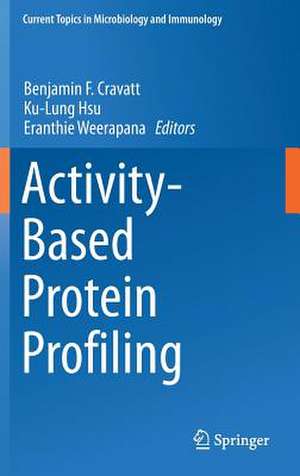Activity-Based Protein Profiling: Current Topics in Microbiology and Immunology, cartea 420
Editat de Benjamin F. Cravatt, Ku-Lung Hsu, Eranthie Weerapanaen Limba Engleză Hardback – 7 feb 2019
Din seria Current Topics in Microbiology and Immunology
- 18%
 Preț: 962.03 lei
Preț: 962.03 lei - 5%
 Preț: 1123.13 lei
Preț: 1123.13 lei -
 Preț: 499.76 lei
Preț: 499.76 lei - 5%
 Preț: 967.79 lei
Preț: 967.79 lei - 18%
 Preț: 1118.62 lei
Preț: 1118.62 lei - 5%
 Preț: 717.00 lei
Preț: 717.00 lei - 5%
 Preț: 712.97 lei
Preț: 712.97 lei - 5%
 Preț: 709.51 lei
Preț: 709.51 lei - 5%
 Preț: 709.51 lei
Preț: 709.51 lei - 5%
 Preț: 721.19 lei
Preț: 721.19 lei - 5%
 Preț: 359.78 lei
Preț: 359.78 lei - 5%
 Preț: 711.88 lei
Preț: 711.88 lei - 5%
 Preț: 774.81 lei
Preț: 774.81 lei - 15%
 Preț: 640.06 lei
Preț: 640.06 lei - 5%
 Preț: 717.00 lei
Preț: 717.00 lei - 5%
 Preț: 360.34 lei
Preț: 360.34 lei - 5%
 Preț: 707.69 lei
Preț: 707.69 lei - 5%
 Preț: 717.56 lei
Preț: 717.56 lei - 5%
 Preț: 716.28 lei
Preț: 716.28 lei - 5%
 Preț: 717.20 lei
Preț: 717.20 lei - 5%
 Preț: 711.32 lei
Preț: 711.32 lei - 5%
 Preț: 711.88 lei
Preț: 711.88 lei - 5%
 Preț: 718.29 lei
Preț: 718.29 lei - 5%
 Preț: 709.51 lei
Preț: 709.51 lei - 5%
 Preț: 369.84 lei
Preț: 369.84 lei - 5%
 Preț: 712.25 lei
Preț: 712.25 lei - 5%
 Preț: 716.45 lei
Preț: 716.45 lei - 5%
 Preț: 706.60 lei
Preț: 706.60 lei - 5%
 Preț: 711.52 lei
Preț: 711.52 lei - 5%
 Preț: 713.54 lei
Preț: 713.54 lei - 5%
 Preț: 720.47 lei
Preț: 720.47 lei - 5%
 Preț: 725.42 lei
Preț: 725.42 lei - 5%
 Preț: 708.06 lei
Preț: 708.06 lei - 5%
 Preț: 713.70 lei
Preț: 713.70 lei - 5%
 Preț: 705.83 lei
Preț: 705.83 lei - 5%
 Preț: 710.96 lei
Preț: 710.96 lei - 5%
 Preț: 723.93 lei
Preț: 723.93 lei - 5%
 Preț: 707.69 lei
Preț: 707.69 lei - 5%
 Preț: 715.35 lei
Preț: 715.35 lei - 5%
 Preț: 709.87 lei
Preț: 709.87 lei - 5%
 Preț: 359.05 lei
Preț: 359.05 lei - 5%
 Preț: 374.20 lei
Preț: 374.20 lei - 15%
 Preț: 635.31 lei
Preț: 635.31 lei - 5%
 Preț: 707.86 lei
Preț: 707.86 lei - 5%
 Preț: 721.96 lei
Preț: 721.96 lei - 15%
 Preț: 632.88 lei
Preț: 632.88 lei - 15%
 Preț: 632.05 lei
Preț: 632.05 lei - 15%
 Preț: 642.83 lei
Preț: 642.83 lei - 5%
 Preț: 709.14 lei
Preț: 709.14 lei
Preț: 1045.42 lei
Preț vechi: 1100.44 lei
-5% Nou
Puncte Express: 1568
Preț estimativ în valută:
200.04€ • 208.86$ • 165.56£
200.04€ • 208.86$ • 165.56£
Carte tipărită la comandă
Livrare economică 05-19 aprilie
Preluare comenzi: 021 569.72.76
Specificații
ISBN-13: 9783030111427
ISBN-10: 3030111423
Pagini: 420
Ilustrații: X, 417 p. 115 illus., 70 illus. in color.
Dimensiuni: 155 x 235 x 31 mm
Greutate: 0.77 kg
Ediția:1st ed. 2019
Editura: Springer International Publishing
Colecția Springer
Seria Current Topics in Microbiology and Immunology
Locul publicării:Cham, Switzerland
ISBN-10: 3030111423
Pagini: 420
Ilustrații: X, 417 p. 115 illus., 70 illus. in color.
Dimensiuni: 155 x 235 x 31 mm
Greutate: 0.77 kg
Ediția:1st ed. 2019
Editura: Springer International Publishing
Colecția Springer
Seria Current Topics in Microbiology and Immunology
Locul publicării:Cham, Switzerland
Cuprins
Activity-based protein profiling – enabling multimodal functional studies of microbial communities.- Activity-Based Protein Profiling Methods to Study Bacteria: The Power of Small-Molecule Electrophiles.- Opportunities and Challenges in Activity-Based Protein Profiling of Mycobacteria.- Activity-Based Protein Profiling at the Host–Pathogen Interface.- Chemical Proteomic Profiling of Protein Fatty-Acylation in Microbial Pathogens.- How to Target Viral and Bacterial Effector Proteins Interfering with Ubiquitin Signaling.- ABPP and Host–Virus Interactions.- Activity-Based Protein Profiling for the Study of Parasite Biology.- Deciphering T Cell Immunometabolism with Activity-Based Protein Profiling.- Small-Molecule Inhibitors of PARPs: From Tools for Investigating ADP-Ribosylation to Therapeutics.- Development of Activity-Based Proteomic Probes for Protein Citrullination.- Recent Advances in Activity-Based Protein Profiling of Proteases.- Opportunities for Lipid-Based Probes in the Field of Immunology.- Activity-Based Protein Profiling of Non-ribosomal Peptide Synthetases.- Target Identification of Bioactive Covalently Acting Natural Products.- Applications of Reactive Cysteine Profiling.
Notă biografică
Benjamin F. Cravatt, Ph.D.
Department of Chemistry
The Scripps Research Institute
La Jolla, CA, USA
cravatt@scripps.edu
Ku-Lung Hsu Ph.D.
University of Virginia School of Medicine
Department of Chemistry
Charlottesville, VA, USA
kh4ch@virginia.edu
Eranthie Weerapana Ph.D.
Boston College
Merkert Chemistry
Chestnut Hill, MA, USA
eranthie@bc.edu
Department of Chemistry
The Scripps Research Institute
La Jolla, CA, USA
cravatt@scripps.edu
Ku-Lung Hsu Ph.D.
University of Virginia School of Medicine
Department of Chemistry
Charlottesville, VA, USA
kh4ch@virginia.edu
Eranthie Weerapana Ph.D.
Boston College
Merkert Chemistry
Chestnut Hill, MA, USA
eranthie@bc.edu
Textul de pe ultima copertă
This volume provides a collection of contemporary perspectives on using activity-based protein profiling (ABPP) for biological discoveries in protein science, microbiology, and immunology. A common theme throughout is the special utility of ABPP to interrogate protein function and small-molecule interactions on a global scale in native biological systems. Each chapter showcases distinct advantages of ABPP applied to diverse protein classes and biological systems. As such, the book offers readers valuable insights into the basic principles of ABPP technology and how to apply this approach to biological questions ranging from the study of post-translational modifications to targeting bacterial effectors in host-pathogen interactions.
Caracteristici
Provides new insights into activity-based protein profiling (ABPP), which uses chemical probes to profile the functional state of enzymes in native biological systems Focuses on the application of ABPP methodologies to processes relevant to microbiology and immunology Helps readers identify the posttranslational regulatory mechanisms that modulate protein function
